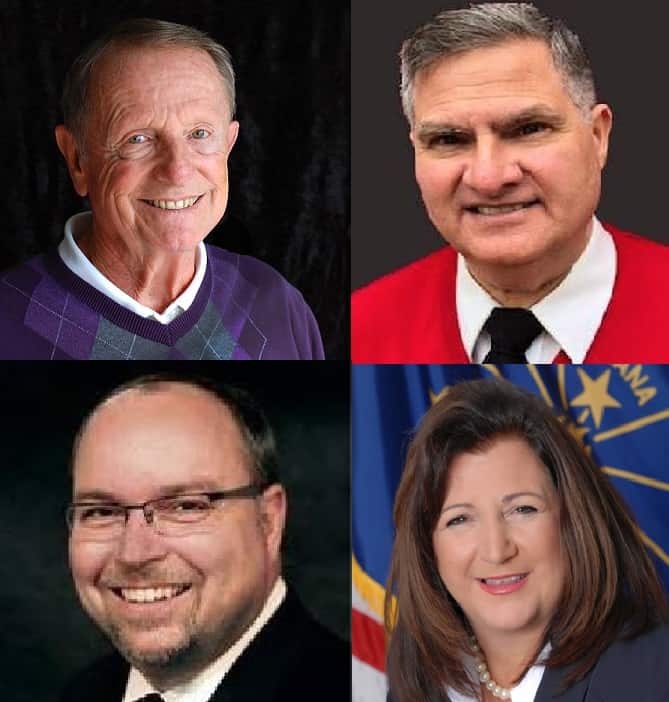In a scene that might have been unthinkable 10 or 15 years go, four conservative candidates for Indiana state representative – including two incumbents – all suggested they either support or lean toward legalizing medical marijuana.
The comments were heard Tuesday during a public forum featuring candidates for a variety of elected positions, including two seats in the General Assembly.
The event was held at the Performing Arts Center at Warsaw Community High School.
The candidates – 18th District Rep. Dave Wolkins and his challenger, Russ Reahard, and District 22 Rep. Curt Nisly and his challenger, Kim Cates – were asked where they stood on whether to legalize medical and recreational marijuana.
Unlike Sunday alcohol sales, which was strongly supported for years by the public before the ban was rescinded this year, some of the four candidates pointed to public opinion concerning medical marijuana as the reason for their support.
At the same time, all four strongly opposed legalizing recreational marijuana.
The four candidates differed very little on medical marijuana and their opinions come at a time when 29 states permit the use and another nine states allow recreational use.
Three states surrounding Indiana – Michigan, Ohio and Illinois – permit medical marijuana with approval from a doctor.
State lawmakers this year agreed to look at medical use in a summer study committee, which could open the door for consideration next year.
Reahard said he would support medical use, but would seek to prohibit users from driving while under the influence. He said states that have approved recreational use have seen an increase in traffic accidents. He also said he believes it hurts productivity in the workplace.
Wolkins said he has changed his outlook on medical use, pointing to a survey among constituents that suggested 53 percent support it.
He said the legislature, in exploring the issue, will look for “best practices” among states that allow medical use. He did express concern about people gaining access with what might be flimsy medical reasons.
“If we could figure out how to make it so that just those who need it and use it can be controlled, then I could probably be convinced to support it,” Wolkins said.
Cates said she agrees with medical use “in certain circumstances,” but opposes a blank check for doctors to write prescriptions.
Cates said she continues to view pot as a gateway drug.
Nisly said he wants the legislature to look at the “medical benefits – if there are any” – as well as the impact on society.
He said he would listen to constituents. He said he is hearing “plenty of requests for us to consider medical marijuana” as he campaigns door to door.
Candidates also were asked about their opinions on whether gun owners should be able to carry guns without licensing.
Wolkins said he personally supports the concept, but constituents do not. He said he would have voted against the measure if it had come to a vote this year.
Cates touted herself as a lifetime member of the National Rifle Association, but said she believes gun owners need to be licensed to carry. She said she supports licensing and background checks and that she does not believe it infringes on Second Amendment rights.
Nisly supports “constitutional carry” and said gun rights should not be subject to any restrictions.
Nisly said his door–to–door campaigning has given him a better understanding of constituent feelings compared to surveys that he claims are drafted by legislative leaders.
Wolkins countered by saying more than a dozen lawmakers have sought opinions through surveys and results were similar to the results he found in which more than 60 percent opposed constitutional carry.
Reahard said he supports the idea.
“That’s one of the rights that comes from God,” Reahard said.
Licensing, he said, is an effort by the state to deny and take away rights from residents.
The four candidates all cast themselves as being “prolife,” but varied on opinions over the controversial “protection at conception” proposed by Nisly over the past two years.
The legislation was shelved by Republican leaders this year and is opposed by Indiana Right To Life.
Cates said she opposes Nisly’s bill because there are no exceptions, which could in some instances endanger the life of the mother.
Nisly said science has shown that life begins at conception.
“I don’t believe that a life should be destroyed under the circumstances in which it was created,” Nisly said.
Reahard supports Nisly’s bill and also contends science shows life begins at conception.
“We have science on our side. We have truth on our side. We have God on our side. If God is for us, who could stand against us,” Reahard said. “For me, as a Christian, I hear the commands of Scripture that say stand up and be the voice for the voiceless.”
Wolkins does not support the bill because he said it would end up in court, would not become law and would cost the state large sums in legal fees.
He said he’s supported every other pro–life bill since 2010, except for Nisly’s bill.
He said he won’t support that type of legislation until President Donald Trump is able to add more conservative voices to the Supreme Court.
The forum continued for about 21⁄2 hours and included brief statements from some township candidates, four candidates running for sheriff and a debate between two candidates running for southern district county commissioner.





